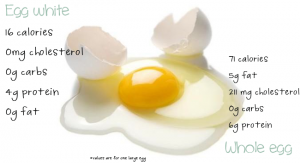I get this question a fair amount, so I thought I’d do a lovely post on what foods one should ABSOLUTELY avoid when trying to lose weight. I’m talking about the type of food that can single handedly sabotage your diet, make you pack on the pounds and set back all the progress you’ve made.
Ready for it?
They don’t exist.
There is no one food (peaches, candies, steak, cake) or one type of food (alcohol, dairy, meat) that will cause any sort of setback in your diet.
Why? Because food is not the enemy. Treating food items or food groups as horrible fiends that trick you into craving them with their addictive additives and their easy accessibility gives them way too much power. It’s an item, composed of macro and micro nutrients, with assorted tastes, flavors and sensations. That’s all. Some are enjoyable, some aren’t.
Furthermore, eating fruit or not eating fruit isn’t going to make or break your diet. Weight loss, specifically fat loss, comes down to energy balance. If you put yourself into a deficit (either by diet or by exercise) you will lose fat. If you put yourself into a surplus (either by diet or lack of exercise/activity) you will gain fat (and/or muscle, depending). That’s it. If a food has 200 calories it has 200 calories. Done. There’s no further discussion from a weight loss point. (Before I get 1,000 asks talking about how 200 calories of veggies and 200 calories of cake are not the same, save it. For weight loss they are, for health they’re not. Go away. You’re annoying and redundant and clearly can’t read.)
Let’s set up a scenario. Say that your TDEE (the amount of calories you burn a day as an active human being) is 2,100. Maybe you’re trying to lose weight, so you put yourself at a 300 calorie deficit every day and eat 1,800 calories a day. Awesome. It’s about 5pm and you’ve had your meals for the day but there’s something extra you’re craving – like a piece of cake. You’ve got about 350 calories left for the day and your mom just brought home a delicious cake – Cheesecake. Your favorite. Turns out the calories for the entire piece add up to 400 calories and she wants to split it right down the middle.
But cake! That’s bad food! It’s always listed on that “DO NOT EAT” diet sheet! Guess what – you’ve got plenty of room to eat that cake. And you know what? It’s your favorite. You’ve worked hard. You have the space for it in your meal plan. You’re still hungry and you WANT this cake.
So eat it. Those 200 calories you just ate of cheesecake isn’t going to suddenly morph into 800 calories in your stomach, then grow to 3,500 calories in your intestines and set back all that great progress!
Say you don’t have any extra calories left for the day but you want the cake and you eat it. You’ve eaten 2,000 calories that day. 2,100 calories will keep your weight. 3,500 calories + 2,100 calories will make you gain a pound.
Take this same advice with any food. No, adding milk to your cereal isn’t going to make you gain weight. Adding milk to every item you eat all day, causing you to go over your calorie limit, will. See how that works?
Instead of obsessing over “good food” and “bad food” focus on how food makes you feel. If you really love a type of food, find a way to incorporate it into your diet in a healthy way. Find recipes that make a smaller serving size so you aren’t plagued with an entire cheesecake going bad in your house. Split desserts with your friends, get rid of the “bad food/good food” dilemma. Food is food.
What you shouldn’t focus on is the food, but the feeling. Do you find that chicken makes you feel full longer without putting you into a food coma? Does too much dairy make you gassy and uncomfortable? Do certain carbs make you retain water like crazy? Are you highly reactive to sodium or cholesterol? These cues are SO much more important than the good food/bad food dichotomy because these experiences are highly personal and can’t be generalized like this.
My take? There’s no such thing as bad food, but there is such a thing as too much food. Moderation moderation moderation!


